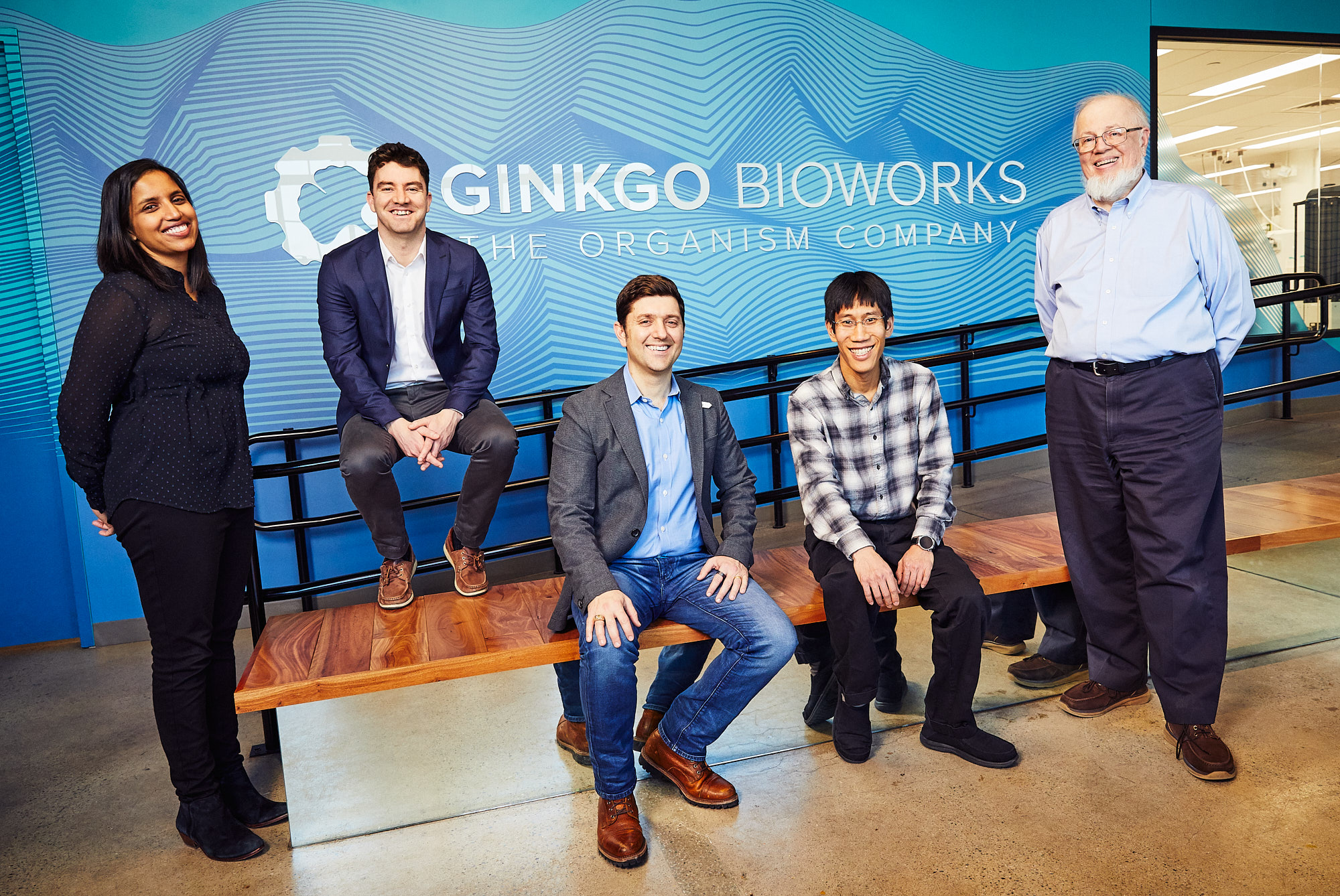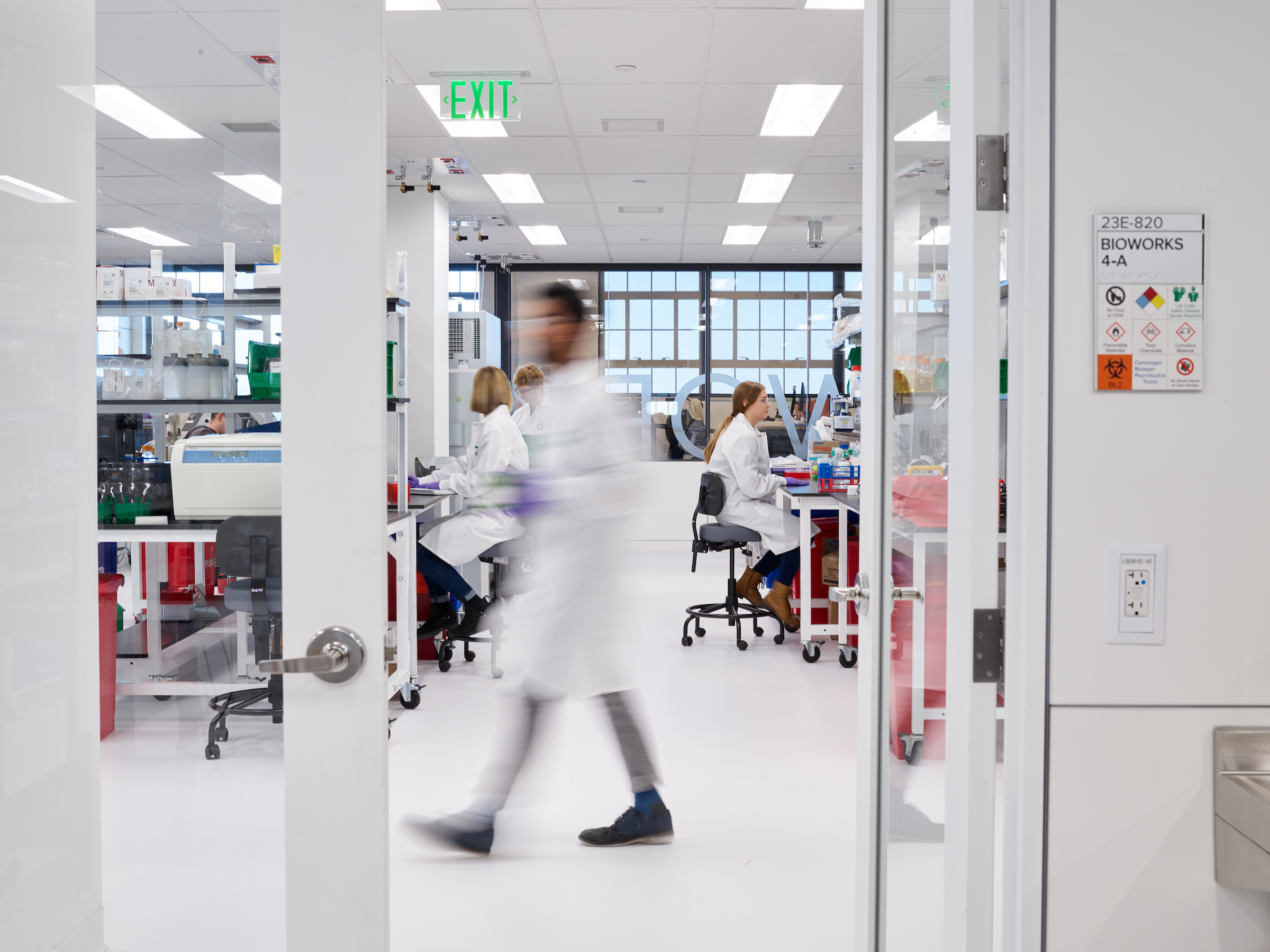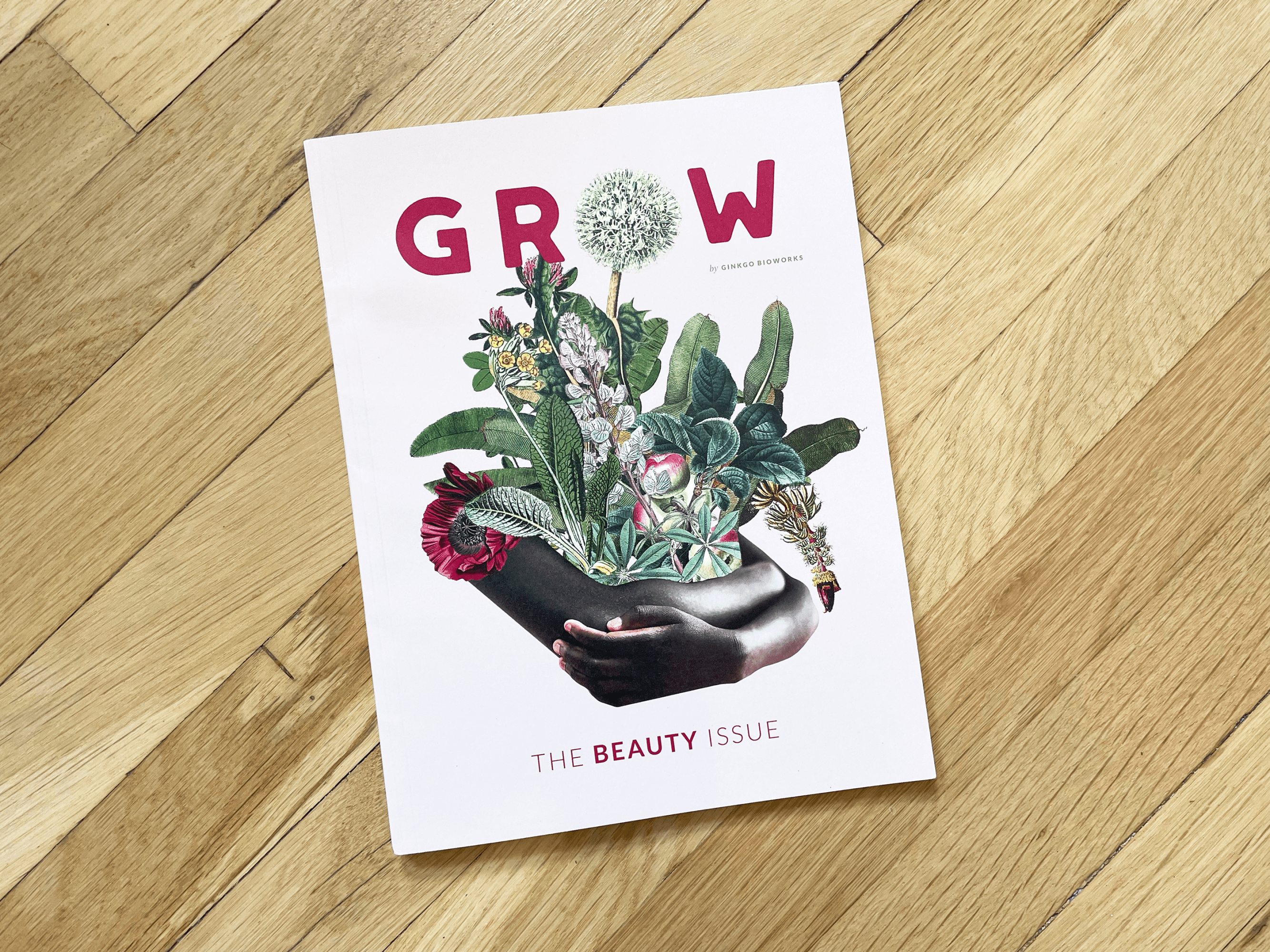Is Ginkgo’s synthetic-biology story worth $15 billion?
Jason Kelly has promised a manufacturing revolution with DNA. Just don’t ask him to make any products.

The Boston genetic engineering company Ginkgo Bioworks and its CEO, Jason Kelly, have been spectacularly successful selling a story: that synthetic biology will transform the manufacture of physical products. What computers did for information, Kelly says, biology will do for the physical world. Instead of making a chemical from petroleum, why not have Ginkgo’s multi-floor “foundry” in Boston's seaport design a yeast cell to manufacture it instead from a broth of sugar water?
I first saw Kelly, a boyish figure in a tight sport coat and sneakers, give his pitch a few years back. It was the same talk he’d been giving successfully in Silicon Valley for years. One slide featured a photo of an Apple computer, an iPhone, a camera, and a metal watch on a gray desk decorated with a potted plant and a black swivel lamp. “What’s the most complicated device on this table?” Kelly asked.
Of course, it’s the house plant. The point is that biology can make just about anything. Think of its incredibly sophisticated miniature machines, like the swirling flagellum that helps a bacterium swim. In Ginkgo’s hands biology would become programmable, revolutionary, and insanely lucrative, just like those famous tech products in the slide. “This is a much more powerful manufacturing platform than any of those other things,” Kelly said.
Given Kelly’s spiel, it is surprising that 13 years after it was founded, Ginkgo can’t name a single significant product that is manufactured and sold using its organisms. To the company’s fans, that’s no problem. They say Ginkgo embodies the biggest trends in DNA science and surely will become the Intel, Microsoft, or Amazon of biology. Kelly has compared Ginkgo to all three. To skeptics, however, Ginkgo is a company with modest scientific achievements and little revenue, and its greatest talents lie in winning glowing press coverage and raising money.
Ginkgo’s story matters because it has become the face of synthetic biology to many investors as it prepares to begin trading as a public stock in September following a merger with a special-purpose acquisition company, or SPAC, called Soaring Eagle. A SPAC is a shell company that sells shares to the public in an IPO with the intention of merging with a promising private business, thereby taking it public too. SPACs can open exciting (and risky) young tech companies to ordinary investors, although it’s at a price negotiated by a small circle of dealmakers. Earlier this year, Soaring Eagle announced it would merge with Ginkgo in a deal that valued the Boston company at $15 billion. Kelly’s stake will be worth well more than $700 million.
Some biotech investors believe this valuation is excessive for a company with little revenue; in 2020 Ginkgo brought in $77 million providing research services and covid-19 tests but lost plenty of money while doing so (more than $137 million, to be exact). “It looks like a great example of a clever story that caught the attention of investors,” says Jean-François Formela, a venture capitalist at Atlas Venture in Cambridge, Massachusetts. “If you boil down the message, it’s that biology is programmable. But it’s not that easy,” he says. Formela adds that the $15 billion valuation “seems insane.”
But in today’s bull market, being a skeptic doesn’t pay. So it’s difficult to say with any certainty what Ginkgo is really worth. After all, a single Bitcoin now costs $48,500 and Tesla has a market capitalization of around $700 billion, more than 10 times that of Ford. “Speaking with assurance on certain types of companies belies how difficult it is to know,” says Doug Cole of Flagship Pioneering, an organization that forms biotech startups in Cambridge. That’s especially true with companies that, like Ginkgo, are “creating new markets.”
Ginkgo’s success telling its story and raising money without introducing significant products has some skeptics wondering whether it will be next in line to crater once reality sets in. Earlier this month Zymergen, a competing synthetic-biology company, saw its stock price plunge 75% in a day after it said sales of its main product, a biological film for foldable phones, would be delayed by at least a year. Zymergen’s CEO, Josh Hoffman, who had also touted a coming era of “biofacturing,” resigned as well.
In a phone call, Kelly said his company purposely isn’t betting on any one product. Instead, he says, Ginkgo is a science and engineering “platform” for other companies to use. He compared Ginkgo to an online app store, except that the apps are programmed cells. Like an app store, Kelly says, Ginkgo will eventually profit by taking a cut of customers’ revenues, in the form of royalties or shares. It will be up to them to make and sell the biomanufactured products.
“I am not a product company, and I have no desire to be a product company,” Kelly told me. “People in biotech are brainwashed to think only products matter.”
Super unicorn
Ginkgo was started in 2008 by Thomas Knight, an MIT computer engineer who had become fascinated with “standardizing” biological research, along with four graduate students, including Kelly. At first the company got by on government grants and cast-off equipment salvaged from MIT’s campus; “we had $150,000 and a U-Haul,” says Kelly. It was a time flush with funding for “synbio” companies, many dreaming of brewing transportation fuel, and Ginkgo barely stood out.
Its fortunes were transformed in 2014, when the startup entered the Y Combinator entrepreneurship program in Silicon Valley. Soon Ginkgo was selling the dream of biology West Coast style, likening it to computing, and investors’ successive injections of cash put it on a path to “super-unicorn” status. It was a private, profitless company that investors were valuing at $1 billion by 2017 and $4.8 billion by 2019, according to PitchBook.
“They were the first real biotech company to come through Y Combinator,” says Michael Koeris, a professor of bioprocessing at the Keck Graduate Institute, who once ran a startup, Sample6, in the same building as Ginkgo. “I think the YC people taught them to package the story so that it is fundable. That is a skill. A lot of science doesn’t get funded because there’s no story.”
Kelly’s gifts as a pitchman are widely acknowledged, and his company is famous for its lavish scientific window dressing. Last year it started printing its own glossy vanity magazine, Grow by Ginkgo, which exists to “tell creative stories” about the endless possibilities of synthetic biology. A recent issue contained a scratch-and-sniff card impregnated with the scent of an extinct flower.
“Times must be good when a young biotech company can afford to hire people to write unrelated magazine-style articles,” snarked Dirk Haussecker, a savvy biotech stock picker who is active on Twitter.
Kelly says the magazine was inspired by Think, a periodical printed by IBM starting in the 1930s. “Why did they do that? Well, no one knew what the heck a computer was,” says Kelly, who sees Ginkgo playing a similar role as an evangelist for the possibilities of genetic engineering.
During a podcast, journalists with Stat News compared Ginkgo to a “meme stock,” or “stonk,” positioned to appeal to an investing public chasing trends without regard for business fundamentals. When the SPAC deal is finalized—sometime in September—the company is going to trade under the stock symbol “DNA,” once owned by Genentech, an early hero of the biotech scene. “Ginkgo Bioworks does not deserve to use the DNA ticker,” said Stat stock reporter Adam Feuerstein.
SPACs are a Wall Street trend that offers an IPO path with a little less than the usual scrutiny of a company’s financial outlook. Will Gornall, a business school professor at the University of British Columbia, believes that they democratize investor access to hot sectors but can also overestimate companies’ value. Some deals, like the one that took Richard Branson’s space company Virgin Galactic Holdings public, have done well, but five electric-car companies that went public via SPACs were subsequently pummeled with what Bloomberg called “brutal” corrections.
Gornall can see a bettor’s logic to the Ginkgo gamble. In recent years stock market profits have been driven by just a handful of tech companies, including Amazon, Apple, Facebook, Google, and Microsoft—each now worth more than a trillion dollars. “The valuation could make sense if there is even a 1% chance that biology is the computer of the future and this is the company that achieves that,” says Gornall.
Other people’s products
Since it was founded, Ginkgo has spent nearly half a billion dollars, much of it building labs equipped with robots, gene sequencers and sophisticated lab instruments such as mass spectrometers. These “foundries” allow it to test genes added to microorganisms (often yeast) or other cells. It claims it can create 50,000 different genetically modified cells in a single day. A typical aim of a foundry project is to assess which of hundreds of versions of a given gene is particularly good at, say, turning sugar into a specific chemical. Kelly says customers can use Ginkgo’s services instead of building their own lab.
What’s missing from Ginkgo’s story is any blockbuster products resulting from its research service. “If you are labeling yourself ‘synbio,’ that is setting the bar high for success—you are saying you are going to the moon,” says Koeris. “You’ve raised so much money against a fantastic vision that soon you need to have a transformative product, whether a drug or some crazy industrial product.”
To date, Ginkgo’s engineering of yeast cells has led to commercial production of three fragrance molecules, Kelly says. Robert Weinstein, president and CEO of the US arm of the flavor and additives maker Robertet, confirmed that his company now ferments two such molecules using yeast engineered by Kelly’s company. One, gamma-decalactone, has a strong peach scent. The other, massoia lactone, is a clear liquid normally isolated from the bark of a tropical tree; used as flavoring, it can sell online for $1,200 a kilogram. Running a fermenter year-round could generate a few million dollars’ worth of such a specialty chemical.

To George Church, a professor at Harvard Medical School, such products don’t yet live up to the promise that synthetic biology will widely transform manufacturing. “I think flavors and fragrances is very far from the vision that biology can make anything,” says Church. Kelly also sometimes struggles to reconcile the “disruptive” potential he sees for synthetic biology with what Ginkgo has achieved. Church drew my attention to a May report in the Boston Globe about Ginkgo’s merger with Soaring Eagle. In it, Kelly said his firm was an attractive investment because the world was becoming familiar with the extraordinary potential of synthetic biology, citing the covid-19 vaccines made from messenger RNA and the animal-free proteins in new plant burgers, like those from Impossible Foods.
“The article was a list of achievements, but the most interesting achievements were from others,” says Church. “It doesn’t seem to add up to $15 billion to me.” Still, Church says he hopes that Ginkgo does succeed. Not only is the company his “favorite unicorn,” but it acquired the remains of some of his own synthetic-bio startups after they went bust (he also recently sold a company to Zymergen). How Ginkgo performs in the future “could help our whole field or hurt our whole field,” he says.
While Ginkgo’s work has not led to any blockbusters, and Kelly allows it’s “frustrating” that biotech takes so long, he says products from other customers are coming soon. The Cannabis company Cronos, based in Canada, says by the end of the year it will be selling intoxicating pineapple-flavored candy containing CBG, a molecular component of the marijuana flower; Ginkgo helped show it how to make the compound in yeast. A spinout from Ginkgo, called Motif FoodWorks, says it expects to have a synthetically produced meat flavor available this year as well.
More recently, Ginkgo has sought to play a bigger role in the manufacture of new biotech drugs, a more lucrative arena. For instance, it says it helped a research supply company called Aldevron improve the production of capping enzymes, which are used in the manufacture of mRNA vaccines. Those enzymes are in high demand because of the covid-19 crisis, and if the process is commercialized, they will represent the most important product Ginkgo has been involved with. That product could see several hundred million in annual sales, which Kelly says Ginkgo will collect part of as royalties.
One problem some see is that making real money in industrial biology is notoriously difficult. Engineering a microbe that performs well in a laboratory reactor is just a first step. Often the organisms need to be further tweaked to grow and thrive under pressure in steel tanks before it’s possible to actually manufacture something. But the trickiest part is making bioproducts inexpensively enough to compete with existing chemical production.
“The biotech landscape is scattered with bodies of companies that couldn’t scale or didn’t think about the economics,” says Chris Guske, a chemical engineer who has worked on some of the world’s largest biorefining products. “Just because you have a bug that produces a gram per liter in a flask doesn’t mean you are ready to be commercial.”
John Melo, CEO of Amyris, another synthetic-biology company, says Ginkgo does not have expertise in large-scale production, and he thinks Kelly is “paranoid” that betting on products “equates to difficulty and failure.” Amyris itself almost collapsed after it failed in a plan to sell biofuels for transportation but is staging a turnaround by manufacturing and selling beauty ingredients and flavors. In Melo’s view, unless things are made with biology at large scales, the dream of renewable manufacturing won’t be any closer. “I think this notion of not being a product company misses the point,” he says. “How can you be enabling sustainability if you don’t make a product?”
Circular revenue
All of biology is being pushed forward by the ability to read DNA, write it, and use those instructions to program organisms or human cells. By automating the use of these technologies, Ginkgo’s backers believe, the company is uniquely positioned to take a commanding position. Harry Sloan, a lawyer and Hollywood executive, is one of the business figures behind Soaring Eagle and previously took the fantasy sports betting company DraftKings public. “These are companies that are not only leaders in their field but actually created the field themselves,” he told the Globe. “That is certainly the case with Ginkgo and synthetic biology.”

In its presentations to investors, Sloan’s group predicts that within four years Ginkgo’s app-store model will have five hundred clients and generate billions of dollars in cash flow. Ginkgo frequently issues press releases announcing new customers, suggesting a growing clamor for its scientific resources. However, many of its customers are not fully independent from Ginkgo. According to Ginkgo’s financial documents, more than half its foundry’s 2020 revenues came from a few “related” companies that it partly owns.
One way Ginkgo creates demand for its services is to form spinout ventures, which then become the customers of its foundries. These deals have sometimes been financed by Ginkgo’s own largest investors, which include the hedge fund Viking Global and Cascade Investments, Bill Gates’s investment firm. Besides Motif FoodWorks, which operates in the same building, Gingko created Allonnia, a company developing microbes to break down pollution, which also subscribes to its foundry services.
Another example of how Ginkgo has financed demand for its services was a collaboration it announced in June 2019: a ”transformational” project with a startup called Synlogic, which is engineering E. coli bacteria to treat serious metabolic disorders. In ongoing studies, patients are swallowing pills filled with germs that have been programmed to carry out helpful functions, like digesting certain excess amino acids, the cause of a disease called phenylketonuria. The deal was important because it signaled that Ginkgo could get involved in potentially profitable new drugs, not only industrial ingredients.
But the way the deal was structured, it was Ginkgo that ended up paying for most of the R&D, not Synlogic. As part of the agreement, Synlogic did cut a check for $30 million in cash to Ginkgo for foundry services aimed at improving its strains. But Ginkgo simultaneously invested $80 million in Synlogic at a sizable premium to its stock price at the time. In effect, the money took a round trip, starting as cash in Ginkgo’s bank account and ending up as payment for foundry services.
Even though Ginkgo underwrote the research, Kelly has touted the collaboration to investors as an example of its successful business model. After adding DNA to organisms and testing them, he explains, “we give you a tube the size of a thimble that’s got a cell with the genome that you need. And that is all that leaves that big factory. And then you as the customer would grow that in your big tanks … if you’re Synlogic, it’ll go into clinical trials as a therapeutic, right?” In preparation for the SPAC merger, Ginkgo also told investors that it improved the performance of one Synlogic strain of E. coli several times over.
Aoife Brennan, Synlogic’s CEO, says Ginkgo “has absolutely demonstrated” it can improve the performance of E. coli strains, particularly if the job involves an automated “bake-off” between versions of a genetic pathway to see which is best. With its investment in automation, Ginkgo says, it is constantly lowering the cost of experiments and increasing the number of organism designs that it can test, a metric it refers to as “Knight’s Law,” after its founder. In this case, Ginkgo screened more than 1,000 genes and created several hundred strains.

That type of automated procedure, Brennan says, is helpful “when you know what you are looking for” but is “sometimes is still not what we need.” Often, research problems are instead solved by scientific “tinkering,” she says, or tests that aren’t easily automated. Indeed, the particular organisms Ginkgo helped engineer were not successful after they failed to “reach our criteria to advance the project” into clinical testing, Brennan says. Instead, this summer Synlogic announced it would begin human tests of a new version of its E. coli engineered by enEvolv, a startup recently purchased by Zymergen, which she says brought capabilities to the project that Ginkgo did not have at the time.
By forming spinouts and taking equity in its customers, Ginkgo can seem to be acting as much like a venture capital firm as a research company. For instance, Kelly, along with his company’s largest outside investor, Viking Global (it owns 20% of Ginkgo), came to the financial aid of Genomatica, a company making plastic precursors and facing a costly push to commercialization. That company wound up largely owned by Viking and Ginkgo, while also becoming one of Ginkgo’s customers. A person formerly close to Genomatica described Ginkgo as acting as “an arm of Viking” whose true business could be described as financial engineering, not genetic engineering. This person called Gingko “effective” because of how they can use capital to “organize the market” and “reignite interest in synthetic biology.”
Ginkgo’s practice of juicing up demand by investing in its customers, trading foundry work for equity, and financing demonstration projects was the subject of a 2020 Harvard Business School case study, which concluded that the arrangements were useful for “explaining Ginkgo’s future growth and untapped potential” to its own investors. But the arrangements make Ginkgo’s finances a little harder to figure out, even for Ginkgo.
Kelly confirmed that some of the CEOs of Ginkgo’s partners, including the head of Motif, raised concerns to him about the unpredictable way Ginkgo was expending the foundry credits they’d been awarded. Basically, Ginkgo was dividing the cost of running its foundry between whatever customers it happened to have, rather than billing them at fixed rates, which it does now. Brennan says the “loosey-goosey” accounting created challenges for her company, which is public already and had to file quarterly reports with the US Securities and Exchange Commission. After the group raised the concerns, Kelly quickly solved the problem. “You can fix a lot of things with money,” says Brennan. “And they have a lot of money.”
In an interview, Brennan says she is pleased to have Kelly involved with her company, calling him a supportive shareholder whose view is that “if we are successful, then they are too.” Kelly’s belief in synthetic biology is unflagging, and his support has continued even as Synlogic’s stock price has slumped, erasing about three quarters of Ginkgo’s investment on paper.
“He is very charismatic,” she says of Kelly. “It is nirvana to have an investor who also believes engineered bacteria will be on the shelf at CVS helping people one day.”
Deep Dive
Biotechnology and health
FDA advisors just said no to the use of MDMA as a therapy
The studies demonstrating MDMA’s efficacy against PTSD left experts with too many questions to greenlight the treatment.
Biotech companies are trying to make milk without cows
The bird flu crisis on dairy farms could boost interest in milk protein manufactured in microorganisms and plants.
Is this the end of animal testing?
Researchers are increasingly turning to organ-on-a-chip technology for drug testing and other applications.
What’s next for MDMA
The FDA is poised to approve the notorious party drug as a therapy. Here’s what it means, and where similar drugs stand in the US.
Stay connected
Get the latest updates from
MIT Technology Review
Discover special offers, top stories, upcoming events, and more.